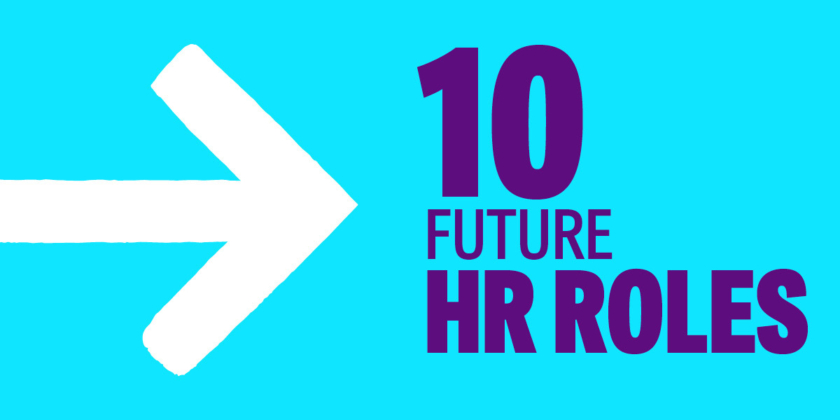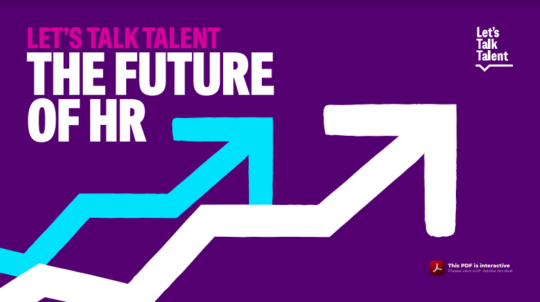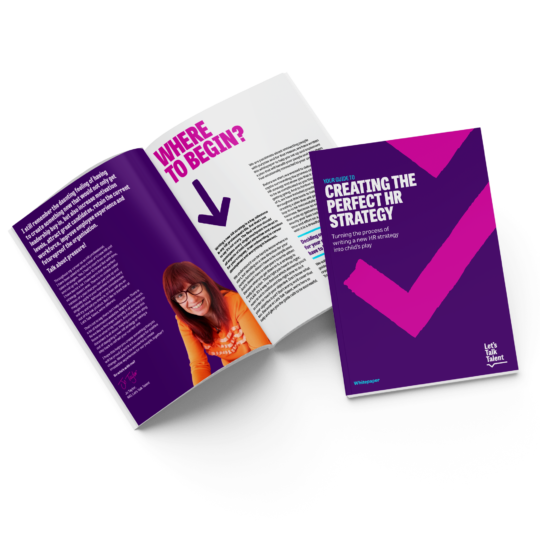Getting your HR team ready for the future of work
The HR industry is constantly evolving. Some of the changes it has seen over the years were led by external events, others by a deep desire to continually improve the employee experience and make it as good as it can be. So what will HR departments bring along with their next transformation? How can the future of work be optimised, streamlined and improved by innovative HR departments everywhere? And is your team ready for what will be the new reality?
It’s no secret that it’s a candidate’s market. Businesses who want to succeed in getting, growing and keeping great people over the next few years should ask themselves why people come to work everyday, and focus their energy on creating the kind of kickass work environment recruits will want to join.
At Let’s Talk Talent, we believe organisations that set themselves up to generate motivation through cause, career and community (the 3Cs of motivation) will see a considerable difference in the effectiveness of their talent strategy. And with the recent development in technology, HR departments are more equipped than ever to anticipate the requirements of the future workforce.
It’s just a matter of setting your team up for success by creating the kind of structure that will support the needs of your talent pool, now and in the future. To help you get started, here is a list of the ten roles your HR team should implement.
In this article, we will explore:
Leading the business transformation
1. Head of HR Innovation
We know that change happens fast, and organisations need to be proactive. The role of head of HR innovation is to anticipate change, and introduce new and creative ways to get, keep and grow great people.
HR teams are often so busy putting out fires that it can be difficult to find the time to be innovative. Add to this the many laws, policies and rules HR professionals have to follow and innovation can become a hard target to reach. The person in this position will need to rip up the rulebook and enable organisations to continuously look ahead and shape the employee experience for the better.
“This requirement isn’t new,” says Claire Koryczan, associate at Let’s Talk Talent. “It began to manifest itself in the last decade as technology started to have a bigger and bigger impact on businesses,” she adds.
2. Head of Business Transformation
C-suites are busy finding new ways to grow the organisation and adapt to a constantly evolving market. HR departments need to align themselves closely to the business’s strategy in order to support its transformation from within. Which can prove harder than it looks! After all, we know that HR employees are great with people, but they now need to add a new arrow to their quiver: the use of technology to streamline operations. This role will put a tech-savvy professional at the very core of the HR function to improve processes and make use of digital solutions to optimise the employee journey.
3. Future Skills Trainer
Establishing a business strategy is one thing. Making sure you have the in-house skills to deliver that strategy is quite another. Here, the future skills trainer should work as part of the leadership team to break down its objectives and establish the expertise and skills needed to reach them.
This role requires a fair amount of foresight, and scanning the horizon to tell fad from future trend is key. “It’s about bridging the gap between the skills you currently have, and the ones you need to develop,” adds Claire.
Taking ownership of HR communications
4. HR Communications Specialist
Within each HR team, there is a need for someone to fully own messages coming out of the department. As communications are usually sent out by different areas of the business, there is often a disconnect. This can lead to inconsistent or disjoined messaging. The HR communications specialist should be given the tools to shape the employee experience by initiating all communications related to the touchpoints that form part of it. This way, they will establish and maintain a consistent tone of voice, connect with employees on an emotional level and engage audiences inside and outside of the organisation.
5. HR Marketing Manager (Employee Value Proposition)
Similar to the HR communications specialist, the HR marketing manager should look at all communications issued from a branding point of view. Everything related to your employee value proposition (EVP) should be owned by a central HR marketing function so it can work as a whole. The objective? To sell the dream! To both prospects and current employees. Working closely with other teams, the HR marketing manager will devise and safeguard a distinct visual identity for everything that comes out of your department, from job postings to your careers website.
“Don’t forget that putting your best foot forward doesn’t mean false advertising,” cautions Jo. “Your EVP is your shop window, of course, but it should always be a true reflection of what it’s like to work for you.”
Purchase our EVP toolkit to get started with this core pillar of your HR strategy.
Data-driven HR
6. HR Data Analyst / Digital Tech Specialist
Data has long proven its usefulness when it comes to informing HR priorities. But very few of us are able to interpret data in a truly meaningful way. This is why a data specialist is a crucial addition to any HR function. As well as providing insight on current issues and potential areas of improvement to the rest of the team, this person can spot upcoming trends and early warning signs, perhaps even with the help of AI tools. “But it’s not just about providing fancy dashboards in real time,” says Claire. “The data specialist should be responsible for telling the story behind those numbers, so the leadership team can act swiftly and take the right course of action.”
Download our ultimate list of HR metrics to get started on collecting data.
The future of employee wellbeing
7. Head of Careers
Most HR departments do not have a dedicated person whose sole focus is on developing employees’ careers. Surprising, isn’t it? Particularly if we consider that lack of career opportunities is the number one reason behind employees leaving their organisation.
At LTT, we believe that keeping and growing great people should be a full time job. From reviewing current career paths to creating new ones, from tracking where people are on their career journeys to making sure they have everything they need to reach their professional goals, looking after people’s careers warrants a dedicated role.
Download our free career development whitepaper for some guidance.
8. Employee Coach
A coach is one of your greatest assets when it comes to reaching business objectives. And the demand for coaching isn’t about to go down (read about future coaching trends in our previous article). Whilst most organisations recognise the benefits of coaching and often call upon external coaches to support their employees, there is something to be said about having someone in-house. An internal coach doesn’t require an onboarding period with each new coachee, and they can get up to speed quickly.
Having someone on hand full-time also makes it possible to expand your coaching offering to more than a handful of people. Usually reserved for the C-suite or high potential candidates, coaching could be a powerful attraction lever when offered to a wider selection of employees.
9. Chief Happiness Officer
Whichever variation on the title you want to use, the main purpose of this job is simple: to focus on your staff’s wellbeing. And with the recent changes in working modes, the hybrid reality and shifting employee expectations, this role is more crucial than ever. At LTT, we believe that your chief happiness officer should hold a senior position, with the mission to promote wellness, generate deeper engagement and a sense of belonging.
Why is this role needed? Viewing your employee experience through an experiential lens and gaining a better understanding of what your people need to succeed could yield great results for your business. These results could allow you to maximise productivity, increase performance, improve staff retention rates and attract the right candidates to your organisation.
“It may sound like a fancy title, but the job is a simple one: to understand what is needed to get the most out of people, and to make it happen,” summarises Claire.
10. Onboarding Lead
Onboarding is only one part of the entire employee experience. However, it is one of the most important ones. According to research, about 64% of employees will attribute their decision to leave an organisation to their onboarding experience. At LTT, we are also hearing more and more stories of candidates dropping out before they’ve even started!
Surely these findings warrant dedicated onboarding leads to make the process as good as it can be! With remote and hybrid working, organisations need to work even harder to get people up to speed quickly, and offer them the same opportunities for connections as those available to pre-pandemic joiners.
The future of work and the skills needed within your HR function
There are many trends and fads to consider when planning for the future, and it can be difficult to distinguish one from the other. How can HR departments future-proof themselves, and ensure they can help their organisation to survive and thrive? Simple: by always putting people at the heart of what they do. The roles above, whether focused on careers, technology or wellbeing, all exist for the same purpose: to get, grow and keep great people. They simply do it in ways which aim to be as future forward as possible.
“Create dedicated roles for each of the touchpoints in your employee lifecycle, and make use of technology to personalise the experience, learn from the data and continuously improve the way you do things,” says Jo.
If you would like to plan a future-proof HR function, book a call with us or have a look at our career mapping tool here.
Related Content:
- 9 trends HR Directors need to know in 2023 [Blog]
- Managing leadership change: how HRs can manage a new CEO [Blog]
- 6 trends to consider in your HR Strategy for 2023 [Blog]
- Self-care and wellbeing tips for HR professionals over the summer break [Blog]
- Navigating Future Career Paths with Tiffany St James – The Potential for What? [Podcast]
- Appetite for uncertainty with Alan Robertson – The Potential for What? [Podcast]


